名词性从句的翻译
- 格式:pdf
- 大小:284.79 KB
- 文档页数:16
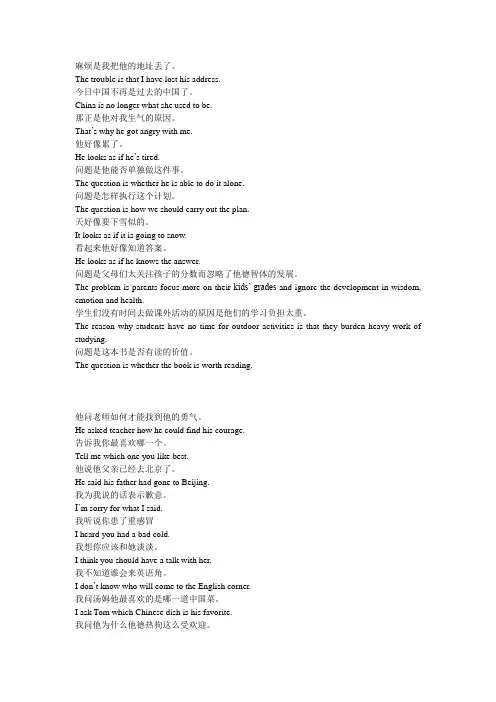
麻烦是我把他的地址丢了。
The trouble is that I have lost his address.今日中国不再是过去的中国了。
China is no longer what she used to be.那正是他对我生气的原因。
That’s why he got angry with me.他好像累了。
He looks as if he’s tired.问题是他能否单独做这件事。
The question is whether he is able to do it alone.问题是怎样执行这个计划。
The question is how we should carry out the plan.天好像要下雪似的。
It looks as if it is going to snow.看起来他好像知道答案。
He looks as if he knows the answer.问题是父母们太关注孩子的分数而忽略了他德智体的发展。
The problem is parents focus more on their kids’ grades and ignore the development in wisdom, emotion and health.学生们没有时间去做课外活动的原因是他们的学习负担太重。
The reason why students have no time for outdoor activities is that they burden heavy work of studying.问题是这本书是否有读的价值。
The question is whether the book is worth reading.他问老师如何才能找到他的勇气。
He asked teacher how he could find his courage.告诉我你最喜欢哪一个。
Tell me which one you like best.他说他父亲已经去北京了。
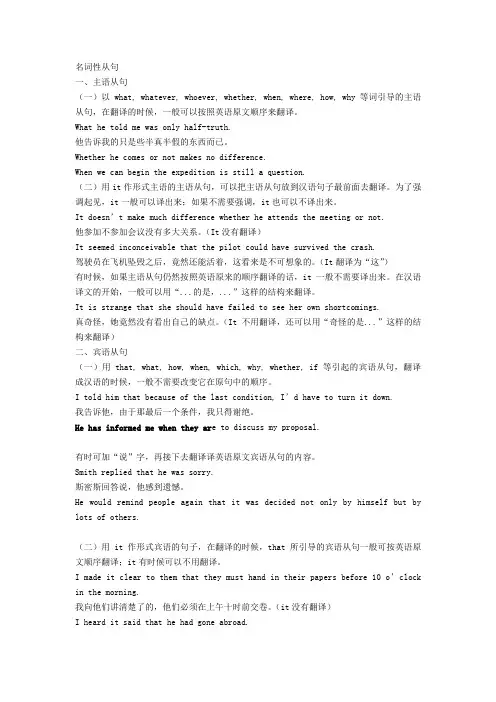
名词性从句一、主语从句(一)以what, whatever, whoever, whether, when, where, how, why等词引导的主语从句,在翻译的时候,一般可以按照英语原文顺序来翻译。
What he told me was only half-truth.他告诉我的只是些半真半假的东西而已。
Whether he comes or not makes no difference.When we can begin the expedition is still a question.(二)用it作形式主语的主语从句,可以把主语从句放到汉语句子最前面去翻译。
为了强调起见,it一般可以译出来;如果不需要强调,it也可以不译出来。
It doesn’t make much difference whether he attends the meeting or not.他参加不参加会议没有多大关系。
(It没有翻译)It seemed inconceivable that the pilot could have survived the crash.驾驶员在飞机坠毁之后,竟然还能活着,这看来是不可想象的。
(It翻译为“这”)有时候,如果主语从句仍然按照英语原来的顺序翻译的话,it一般不需要译出来。
在汉语译文的开始,一般可以用“...的是,...”这样的结构来翻译。
It is strange that she should have failed to see her own shortcomings.真奇怪,她竟然没有看出自己的缺点。
(It不用翻译,还可以用“奇怪的是...”这样的结构来翻译)二、宾语从句(一)用that, what, how, when, which, why, whether, if 等引起的宾语从句,翻译成汉语的时候,一般不需要改变它在原句中的顺序。
I told him that because of the last condition, I’d have to turn it down.我告诉他,由于那最后一个条件,我只得谢绝。
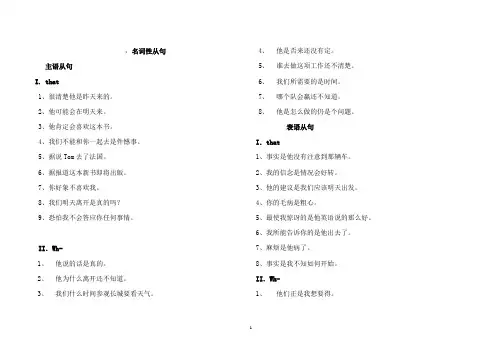
,名词性从句主语从句I. that1、很清楚他是昨天来的。
2、他可能会在明天来。
3、他肯定会喜欢这本书。
4、我们不能和你一起去是件憾事。
5、据说Tom去了法国。
6、据报道这本新书即将出版。
7、你好象不喜欢我。
8、我们明天离开是真的吗?9、恐怕我不会答应你任何事情。
II.Wh-1、他说的话是真的。
2、他为什么离开还不知道。
3、我们什么时间参观长城要看天气。
4、他是否来还没有定。
5、谁去做这项工作还不清楚。
6、我们所需要的是时间。
7、哪个队会赢还不知道。
8、他是怎么做的仍是个问题。
表语从句I.that1、事实是他没有注意到那辆车。
2、我的信念是情况会好转。
3、他的建议是我们应该明天出发。
4、你的毛病是粗心。
5、最使我惊讶的是他英语说的那么好。
6、我所能告诉你的是他出去了。
7、麻烦是他病了。
8、事实是我不知如何开始。
II.Wh-1、他们正是我想要得。
2、问题是它是否值得一做。
3、问提是我们该作些什么来帮助他。
4、问题是谁留下。
5、那就是他出生的地方。
6、我们就是这样分手的。
7、我是你正在找的那个人。
8、这就是我去那的原因同位语从句I.that1、我听到了我们队获胜的消息。
2、他在会上什么都没说的事实使我们惊讶。
3、他打算来的消息使我们高兴。
4、他已经下定学好英语的决心。
5、他当选的消息不是真的。
II.Wh-1、我不知道他什么时候来。
2、你不知道我多么着急。
3、很难回答你提出的我是如何做的问题。
4、我提出的如何邀请他的问题已经得到了解决。
5、你为什么对音乐感兴趣的问题还没回答。
宾语从句I. That clause1,我认为他们学习很努力。
2,他说他将在11日动身。
3,他告诉我医生马上就来。
4,他说他妈妈在读书。
5,他说他的爸爸生于1948年。
6,我恐怕犯了一个错误。
7,我们有把握成功。
8,对不起我错拿了你的钢笔。
II.Whether/ if1,我想知道他明天是否来。
2,我想知道你是否愿意和我一起去看足球赛。
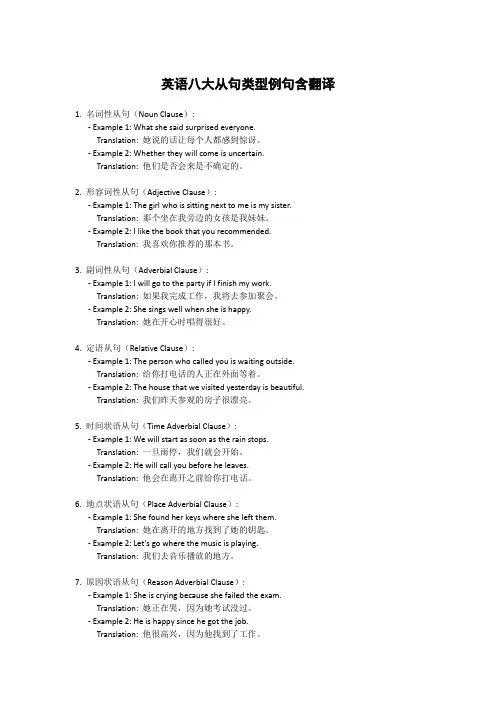
英语八大从句类型例句含翻译1. 名词性从句(Noun Clause):- Example 1: What she said surprised everyone.Translation: 她说的话让每个人都感到惊讶。
- Example 2: Whether they will come is uncertain.Translation: 他们是否会来是不确定的。
2. 形容词性从句(Adjective Clause):- Example 1: The girl who is sitting next to me is my sister.Translation: 那个坐在我旁边的女孩是我妹妹。
- Example 2: I like the book that you recommended.Translation: 我喜欢你推荐的那本书。
3. 副词性从句(Adverbial Clause):- Example 1: I will go to the party if I finish my work.Translation: 如果我完成工作,我将去参加聚会。
- Example 2: She sings well when she is happy.Translation: 她在开心时唱得很好。
4. 定语从句(Relative Clause):- Example 1: The person who called you is waiting outside.Translation: 给你打电话的人正在外面等着。
- Example 2: The house that we visited yesterday is beautiful.Translation: 我们昨天参观的房子很漂亮。
5. 时间状语从句(Time Adverbial Clause):- Example 1: We will start as soon as the rain stops.Translation: 一旦雨停,我们就会开始。
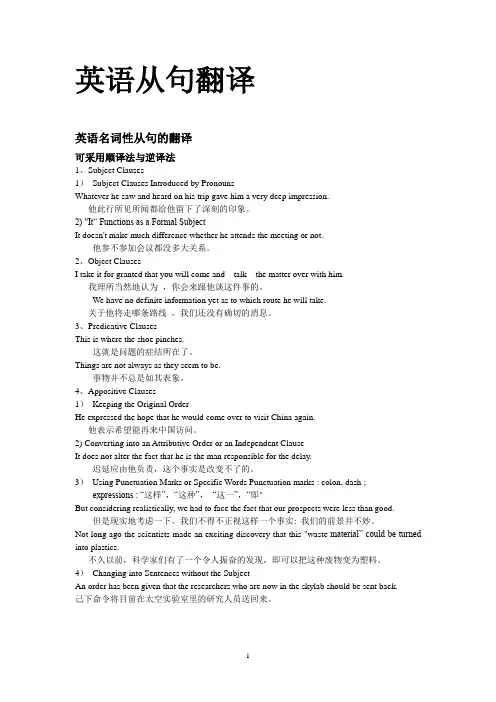
英语从句翻译英语名词性从句的翻译可采用顺译法与逆译法1、Subject Clauses1)Subject Clauses Introduced by PronounsWhatever he saw and heard on his trip gave him a very deep impression.他此行所见所闻都给他留下了深刻的印象。
2) "It“ Functions as a Formal SubjectIt doesn't make much difference whether he attends the meeting or not.他参不参加会议都没多大关系。
2、Object ClausesI take it for granted that you will come and talk the matter over with him.我理所当然地认为,你会来跟他谈这件事的。
We have no definite information yet as to which route he will take.关于他将走哪条路线,我们还没有确切的消息。
3、Predicative ClausesThis is where the shoe pinches.这就是问题的症结所在了。
Things are not always as they seem to be.事物并不总是如其表象。
4、Appositive Clauses1)Keeping the Original OrderHe expressed the hope that he would come over to visit China again.他表示希望能再来中国访问。
2) Converting into an Attributive Order or an Independent ClauseIt does not alter the fact that he is the man responsible for the delay.迟延应由他负责,这个事实是改变不了的。
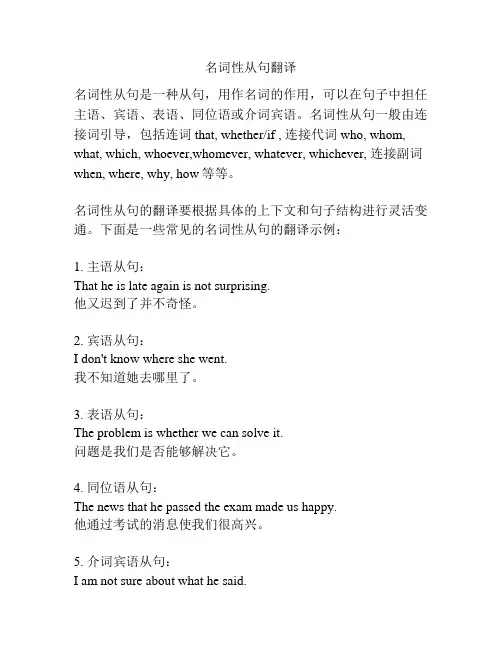
名词性从句翻译名词性从句是一种从句,用作名词的作用,可以在句子中担任主语、宾语、表语、同位语或介词宾语。
名词性从句一般由连接词引导,包括连词that, whether/if , 连接代词who, whom, what, which, whoever,whomever, whatever, whichever, 连接副词when, where, why, how等等。
名词性从句的翻译要根据具体的上下文和句子结构进行灵活变通。
下面是一些常见的名词性从句的翻译示例:1. 主语从句:That he is late again is not surprising.他又迟到了并不奇怪。
2. 宾语从句:I don't know where she went.我不知道她去哪里了。
3. 表语从句:The problem is whether we can solve it.问题是我们是否能够解决它。
4. 同位语从句:The news that he passed the exam made us happy.他通过考试的消息使我们很高兴。
5. 介词宾语从句:I am not sure about what he said.我不确定他说的是什么。
6. 间接引导名词性从句:He asked where I lived.他问我住在哪里。
7. 是否从句:I wonder whether/if she will come to the party.我想知道她是否会来参加派对。
8. 选择性从句:He asked me whether I preferred coffee or tea.他问我是喜欢咖啡还是茶。
9. 宾语从句(陈述句变为疑问句):Do you know what time it is?你知道现在几点钟吗?10. 宾语从句(连接代词):I wonder who is going to pick us up at the airport.我想知道谁会在机场接我们。
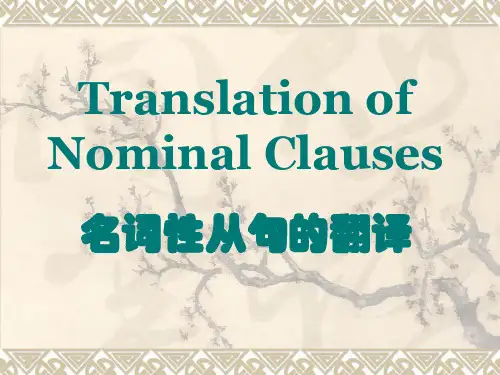

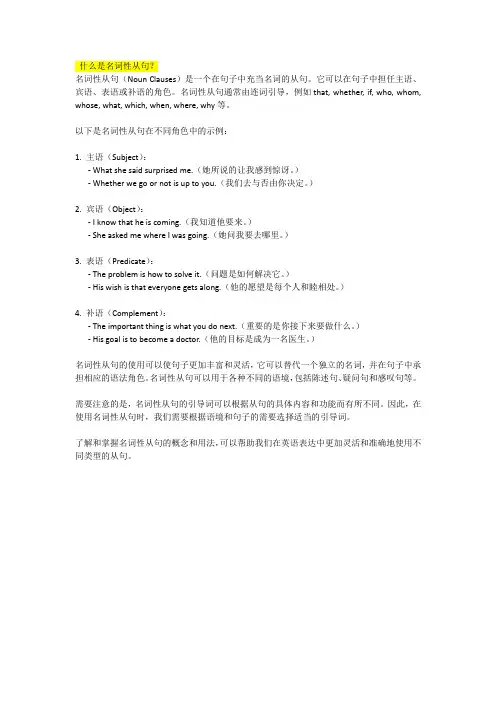
什么是名词性从句?名词性从句(Noun Clauses)是一个在句子中充当名词的从句。
它可以在句子中担任主语、宾语、表语或补语的角色。
名词性从句通常由连词引导,例如that, whether, if, who, whom, whose, what, which, when, where, why等。
以下是名词性从句在不同角色中的示例:1. 主语(Subject):- What she said surprised me.(她所说的让我感到惊讶。
)- Whether we go or not is up to you.(我们去与否由你决定。
)2. 宾语(Object):- I know that he is coming.(我知道他要来。
)- She asked me where I was going.(她问我要去哪里。
)3. 表语(Predicate):- The problem is how to solve it.(问题是如何解决它。
)- His wish is that everyone gets along.(他的愿望是每个人和睦相处。
)4. 补语(Complement):- The important thing is what you do next.(重要的是你接下来要做什么。
)- His goal is to become a doctor.(他的目标是成为一名医生。
)名词性从句的使用可以使句子更加丰富和灵活,它可以替代一个独立的名词,并在句子中承担相应的语法角色。
名词性从句可以用于各种不同的语境,包括陈述句、疑问句和感叹句等。
需要注意的是,名词性从句的引导词可以根据从句的具体内容和功能而有所不同。
因此,在使用名词性从句时,我们需要根据语境和句子的需要选择适当的引导词。
了解和掌握名词性从句的概念和用法,可以帮助我们在英语表达中更加灵活和准确地使用不同类型的从句。
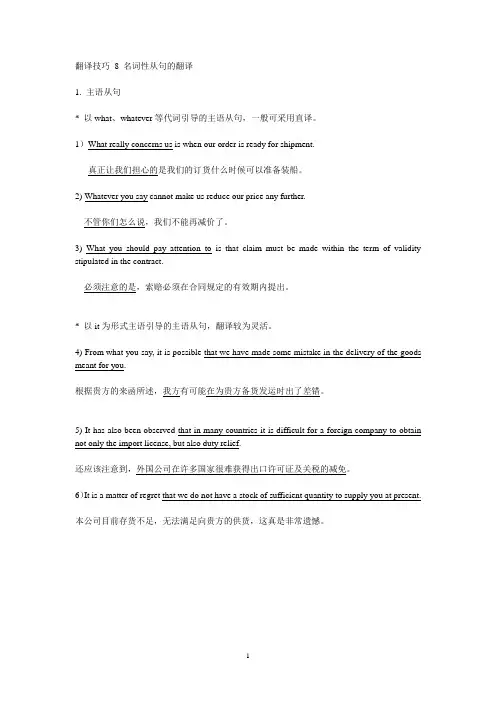
翻译技巧8 名词性从句的翻译1. 主语从句* 以what、whatever等代词引导的主语从句,一般可采用直译。
1)What really concerns us is when our order is ready for shipment.真正让我们担心的是我们的订货什么时候可以准备装船。
2) Whatever you say cannot make us reduce our price any further.不管你们怎么说,我们不能再减价了。
3) What you should pay attention to is that claim must be made within the term of validity stipulated in the contract.必须注意的是,索赔必须在合同规定的有效期内提出。
* 以it为形式主语引导的主语从句,翻译较为灵活。
4) From what you say, it is possible that we have made some mistake in the delivery of the goods meant for you.根据贵方的来函所述,我方有可能在为贵方备货发运时出了差错。
5) It has also been observed that in many countries it is difficult for a foreign company to obtain not only the import license, but also duty relief.还应该注意到,外国公司在许多国家很难获得出口许可证及关税的减免。
6)It is a matter of regret that we do not have a stock of sufficient quantity to supply you at present.本公司目前存货不足,无法满足向贵方的供货,这真是非常遗憾。
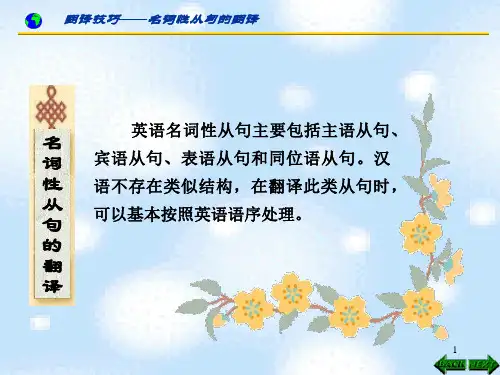
名词性从句的翻译英语的名词性从句包括主语从名、宾语从句、表语从句和同位语从句等。
翻译的时候,大多数可以按照原文的句子顺序翻译成相应的汉语译文。
但是,有时候,可以采用其他翻译方法来灵活处理。
一、主语从句(一)以what, whatever, whoever,whether, when, where, how, why等词引导的主语从句,在翻译的时候,一般可以按照英语原文顺序来翻译。
What he told me was only half-truth. 他告诉我的只是些半真半假的东西而已。
Whatever is worth doing should be done well. 任何值得做的事情都应该做好。
Whether he comes or not makes no difference. 他来不来都没有关系。
When we can begin the expedition is still a question. 我们何时才能开始这次考察仍然是悬而未决。
How he is going to do it is a mystery. 他准备怎么做这个事情是个迷。
(二)用it作形式主语的主语从句,可以把主语从句放到汉语句子最前面去翻译。
为了强调起见,it一般可以译出来;如果不需要强调,it也可以不译出来。
It doesn’t make much difference whether he attends the meeting or not. 他参加不参加会议没有多大关系。
(It没有翻译) It seemed inconceivable that the pilot could have survived the crash. 驾驶员在飞机坠毁之后,竟然还能活着,这看来是不可想象的。
(It翻译为“这”) 有时候,如果主语从句仍然按照英语原来的顺序翻译的话,it一般不需要译出来。
在汉语译文的开始,一般可以用“...的是,...”这样的结构来翻译。
英语名词性从句的翻译英语名词性从句包括主语从句, 宾语从句, 表语从句和同位语从句, 在翻译这类从句时, 大多数可以按照原文的句序翻译成相应的汉语, 但是也有一些具体的处理方法, 下面我们结合一些实例加以说明:例1.How and when human language developed and whether animals such as chimpanzees and gorillas can develop a more elaborate system of communication are issues at present being researched, but as yet little understood.人类的语言是如何发展起来的, 是什么时候形成的, 诸如黑猩猩和大猩猩一类的动物是否会形成一种更加复杂的交流系统, 都是现阶段人们研究的课题, 但对此人们都知之甚少。
(主语从句)例2.How well the prediction will be validated by later performance depends upon the amount, reliability, and appropriateness of the information used and on the skill and wisdom with which it is interpreted. (95年考题)这些预测能在多大程度上被后来的成绩所证实取决于所使用的信息的量、可靠性和适合程度, 并取决于对信息作出解释的技能和智慧。
(主语从句)例3.It is often said that wide reading is the best alternative course of action but even here it is necessary to make some kinds of selection.人们常说, 大量阅读是可供选择的最佳方案, 但即使在这一方面, 也需要某些选择。